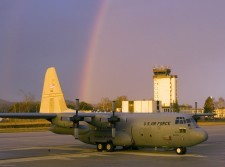
The US is shipping weapons to Iraq to fight terror. Illustrative photo of US cargo plane. Photo Courtesy of U.S. Air Force photo/Master Sgt. John E. Lasky
There’s a rising threat in Iraq, and it has designs on not only taking Iraq’s capital, not only on establishing a new extremist Islamic kingdom from Iraq to Lebanon, but ultimately on attacking Americans as well. The Islamic State of Iraq and the Levant (ISIL), an offshoot of Al-Qaeda, has blossomed in the civil war in Syria and has literally taken over the city of Fallujah in Iraq.
According to testimony from Brett McGurk, Deputy Assistant Secretary for Iran and Iraq at the US State Department, ISIL helped launch a resurgence of terror in Iraq that saw suicide bombings go from 5-10 per month to 30-40 per month. And America is next.
McGurk said in his testimony to Congress, released by the State Department, that ISIL leader Abu Bakr al-Baghdadi threatened the capital of Iraq and the US in an audio message last month. Baghdadi was quoted as saying, “Our last message is to the Americans. Soon we will be in direct confrontation, and the sons of Islam have prepared for such a day.”
In response to the ISIL threat, the US has offered advice, support and increased their sale and lease of advanced weapons to the Iraqis to battle the growing terrorist insurgency. Apache attack helicopters, Hellfire missiles and drones are among the items the US is sending to Iraq’s military to help them destroy ISIL training camps and prevent their influx into Iraq from Syria.
So far, between increased efforts by the Iraqi government and the US, it appears the tide is being turned back on ISIL. McGurk said one city taken by ISIL has been retaken by the Iraqi government. Next on the list is Fallujah. Arming local tribes and giving them military support has proven one effective means of taking back territory from ISIL so far.
One key event coming up for the overall stability in Iraq is the national election at the end of April. McGurk underscored the importance of taking a “holistic” strategy in Iraq, taking into account economics, politics and security.
The threat from ISIL rolled back past success by US troops, and now the Americans are working with the Iraqi forces to regain what was lost.
“I would like to say a brief word to our men and women who served so bravely in these areas of Iraq. I cannot imagine what it must have been like to see al-Qa’ida raise its flag once again in the cities of Fallujah and Ramadi. I was sickened by the spectacle,” McGurk told Congress.
“But I want to ensure everyone who served, and this Committee, that we will do everything possible to help the Iraqis take back their streets. Ramadi is improving, and we will support the Iraqis—and the tribes of Anbar province—re-take Fallujah.”
Just goes to prove that despite the withdrawal of thousands of US troops from the Middle East, the war against terror is not even close to being over.
(By Joshua Spurlock, www.themideastupdate.com, February 6, 2014)
